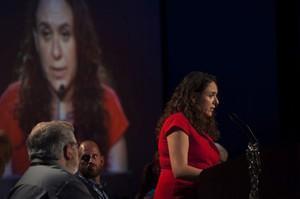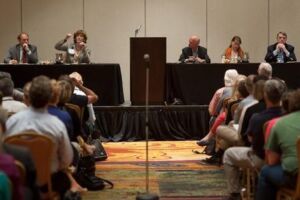Posts by hdcoadmin
Coverage guide for aviation safety
A Boeing jetliner operated by the airline Asiana crashed and caught fire at San Francisco International Airport on its arrival from Seoul on Saturday, killing at least two people and injuring more than 100 others. The National Transportation Safety Board has announced it will investigate, but it could take years to determine the cause of…
Read MoreOutside the U.S., reporting amid danger
By Perla Arellano In areas such as Mexico and parts of the Middle East, many journalists have died in their role as watchdogs. At the recent IRE Conference in San Antonio, the session “Reporting amid danger: When journalist are targeted and newsrooms are infiltrated” included Tim Johnson from McClatchy Newspapers, Gaston Monge Estrada from El…
Read MoreHow journalists can work with whistleblowers and protect sources
Leonard Downie Jr, far right, moderates the 2013 IRE Conference’s showcase panel with, Michael Oreskes of the Associated Press, Lucy Dalglish of the Phillip Merrill College of Journalism, author James Bamford and journalist Quinn Norton. The panel was one of several at the conference focused on leaks and whistleblowers. Photo by Travis Hartman. By Perla…
Read MoreDiscovering data at the IRE Conference
Jewel Loree, of Tableau Software, uses her hands to illustrate how the software reformats data into columns during the Tabluea Public for beginners session. Photo by Travis Hartman. By Kathryn Sharkey It’s a word mentioned over and over at the IRE Conference, whether you’re at a specific panel on the subject or not: data. This…
Read MoreGetting skeptical sources to talk
By Erin Griffin At the recent IRE Conference in San Antonio, Raquel Rutledge of the Milwaukee Journal Sentinel and Michael Isikoff of NBC shared some tips on how to get skeptical sources to talk with you. Below are some of their suggestions: Try to understand why they are reluctant. Throw out some information that they might…
Read MoreTo Cope with Sequester, Justice Department Staffs Unpaid Attorneys
A ProPublica report finds there are 96 unpaid special assistant U.S. attorneys working for the Justice Department, according to a spokesperson, who said paid assistant U.S attorneys have starting salaries ranging from $44,581 to $117,994.
Read MoreNSA in Utah: Mining a mountain of data
In many ways, the new Utah Data Center is the quintessential black box. But a sharper picture of what is likely to go on within its walls has come into focus with recently leaked documents on NSA surveillance, combined with prior revelations, building specifics, information from defense contractors and hints dropped by top NSA brass,…
Read MoreNearly One in Five Members of Congress Gets Paid Twice
About 90 members from both chambers collected a government pension atop their taxpayer-financed $174,000 salary in 2012, National Journal found in an examination of recent financial records. The practice is called “double-dipping.”
Read MoreMatthew Tully: Fireworks lobby ensures nightly barrage in Indiana neighborhoods despite noise, danger
In a state with some of the nation’s loosest laws, fireworks stands pop up this time of year like weeds in your garden — in strip malls, abandoned big-box stores and under tents by the side of the road. Millions of dollars are spent, an estimated $50 million annually in this state alone, on fireworks…
Read MoreOregon Employment Department shake-up casts spotlight on accusations of nepotism
An ongoing investigation by The Oregonian into the Employment Department shake-up shows that familial relationships figured prominently as the agency’s top tier unraveled. The director is retiring after a state probe, the deputy abruptly departed for a lower-paying state job, and the No. 3 was fired as Gov. John Kitzhaber’s administration cleaned house.
Read More The early bird deadline for
The early bird deadline for 


